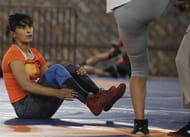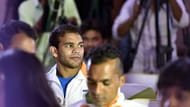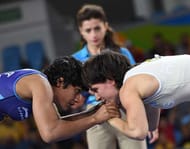As the Indian wrestling squad left for Rio, there was an air of excitement and optimism, justifiably so. India has been performing brilliantly at the Commonwealth level, with virtually clean sweeps from our grapplers over the last two editions of these games. We won 5 medals at the Incheon Asian Games in 2014, with Yogeshwar Dutt, winning us an elusive Gold after decades.
The 2013 World Championships fetched us 3 medals (1 Silver and 2 bronze) and the much maligned Narsingh Yadav won bronze and the Olympic quota last year.
The mushrooming of young talents like Vinesh Phogat, Sakshi Malik and Sandeep Tomar, only served to add fuel to the fire of optimism.
Sakshi Malik’s bronze – The highlight
No praise can be too great, for this ever-smiling girl from Haryana, who enacted the role of a counter-attacker against more experienced and physically stronger opponents to near perfection.
Against the World No.3 Swede Johana Mattson and the Moldovian Mariana Esanu, Sakshi scripted back to the wall comebacks to stun not only her opponents but also the wrestling community. A quarter-final loss to the Russian Koblova, kept Indian fans and Sakshi herself on tenterhooks for a brief while.
Also read: Bronze medallist Sakshi Malik comes home to a hero's welcome
But the Russian opened the door for Sakshi by reaching the final. Given another chance, the tenacious Indian was a lady possessed in the repechage 2nd round bout, against Purevdorjiin Orkhon, with several single and double leg attacks.
The Kyrgyz, Tynybekova lay in wait in the bronze medal contest and what a match it was. Of all the opponents Sakshi had faced earlier, the Kyrgyz was the most dangerous because she was probably the most physical and aggressive. This aggressiveness was so evident in her match against Koblova too. True to form Tynbekova, racked up a five-point lead as she breached the Indian’s defence more than once and used a couple of ankle holds to get behind Sakshi and race to a 5 point lead.
The bronze medal seemed to be slipping away, but to her credit Sakshi never panicked. A couple of takedowns, followed by a strong waist tackle forced Tynbekova on to the mat close to the end of the bout, secured the Indian a 7-5 win, landing India her first medal of the Rio Olympics and the first ever won by an Indian lady wrestler.
Vinesh’s horrific injury – The low

Arguably India’s best bet for an Olympic medal Vinesh Phogat, started brilliantly against her Romanian opponent winning 11-0 despite an elbow injury.
Squaring up against the Chinese Sun Yanan, Vinesh moved into a 1-0 lead, before falling victim to a swift leg tackle, that injured her right knee squashing her hopes of any further participation.
Also read: It has been 6 days and I still cannot get over Vinesh Phogat's heartache
Injuries are part and parcel of any athlete’s career, but what hurts more is that the Olympics come only once in four years. A lot can change over the course of one Olympic cycle. Over a period of time, the physiological aspect of the injury will heal, but the hurt of not achieving her goal of an Olympic Gold could rankle for a long time to come.
The Indian wrestling community will be keenly following Vinesh’s journey towards mental and match fitness over the next few months.
Narsingh Yadav – A non-starter

What can one say about this burly Mumbai wrestler, who had fought so many bouts over the last 3 months outside the mat to just be at Rio?
The unassuming wrestler from the 74 kg category, who has lived in the shadow of Sushil Kumar, had won India’s first wrestling Olympic quota at last year’s World Championships. Little did Narsingh know, that the battle had only just begun.
In the lead up to Rio, Narsingh faced a court battle with Sushil Kumar, after the Wrestling Federation of India, had refused conducting trials.
Once the gremlins of the court battle were banished, NADA slapped a doping offence on him. After convincing NADA of sabotage and conspiracy, he finally arrived in Brazil, only to find further shocks awaiting him.
CAS overruled NADA’s decision and virtually ended the 27-year old’s career with a four-year ban. He was accused of deliberately doping and ingesting the drug more than once.
If Vinesh’s case was bad luck there are no words to describe Narsingh’s fate.
Babita came a cropper

The most experienced of the three Indian women at Rio was only physically present or so it seems in hindsight. Blessed with the easiest of the draws of all Indian grapplers, Babita put up a virtual no-show against an unknown Greek.
Lucky to have avoided wrestlers like Sofia Mattson, Saori Yoshida (up to semi-finals) and her nemesis, the Nigerian Odunayo, Babita of late, does not seem to possess the physical attributes to overcome the best. She seemed a pale shadow of the grappler who had reached the World Championships quarterfinals at Las Vegas last year.
For, Sandeep Tomar, the draw was just the opposite of Babita’s. Facing double world champion Lebedev of Russia in the first round, the inexperienced Indian was always playing catch up against his vastly experienced opponent. Rocked by an early passivity penalty, Tomar was not his usual aggressive self.
Also Checkout: India's Medal Tally in Olympics
The Russian’s defence on the day was rock solid. The referee’s interpretation of the passivity rule, seemed inconsistent, with the Russian distinctly lucky to get away with just a warning in the second period.
Passive is probably the apt word for Yogeshwar Dutt, whose first round loss was as big a shock as Vinesh’s injury.
The margin 0-3 may look small, but Dutt was never in the bout, as he could not match the speed of the Mongolian. There was only one positive attack during the bout, but the Mongolian’s counter was far more effective.
The difference in ages between the two stood out quite clearly. Amongst the wrestlers on display in Dutt’s category, the four on the podium and couple of others looked far stronger than the Indian.
Reality struck where it hurts and real hard.
Introspection the need of the hour
India definitely needs to rejoice Sakshi Malik’s bronze, but as the celebrations wind down, the federation will realize, that India has some work to do even be in the top 10 of the world freestyle wrestling rankings.
These are controversial times, with a lot of factionalism and bruised egos to mend. It is imperative that Sushil and WFI/Yogeshwar mend fences and get together for the betterment of the sport.
The young heads of Sandeep Tomar, Bajrang Punia, Sakshi Malik and Vinesh Phogat do not need the Apex Federation and their seniors squabbling with each other in these troubled times..and of course, there is Narsingh Yadav.
